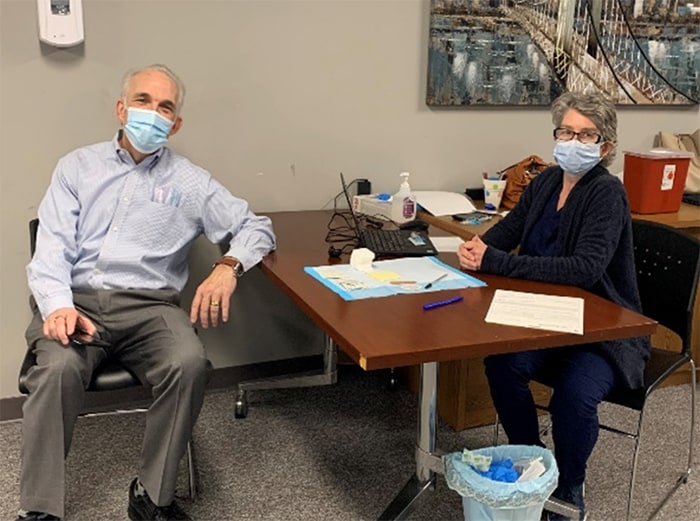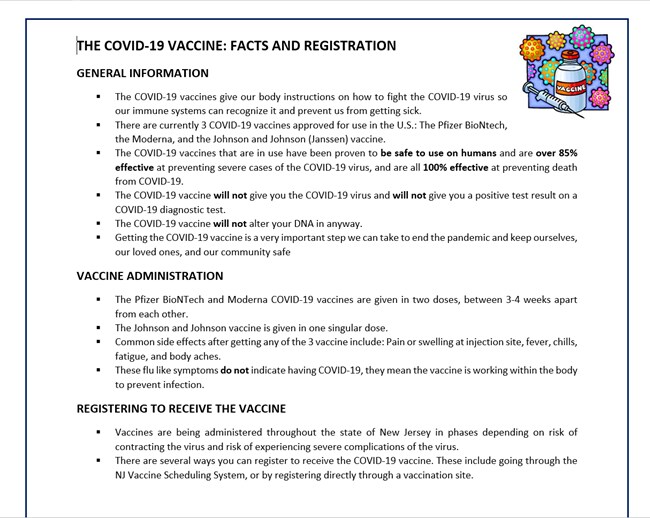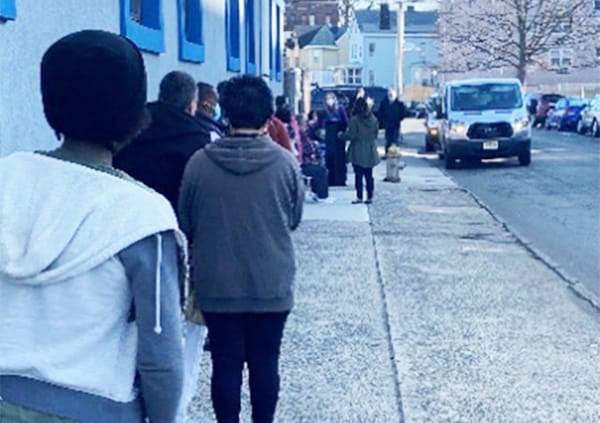New Jersey Mental Health Clinic Becomes Trusted Vaccine Source
Open Communication, Convenient Access Are Key

Bob Davison, CEO of MHA Essex and Morris, and a nurse set up and wait for patients to arrive for COVID-19 vaccinations.
Worries about COVID-19 can be overwhelming and can be particularly challenging for people with mental illnesses. Bob Davison, the CEO of the Mental Health Association (MHA) of Essex and Morris Counties, New Jersey, knows that well. His organization, which is also a primary care clinic, serves 10,000 people annually and over 1,800 on any given day. MHA’s most consistent long-term population is 1,000 patients with severe and persistent mental illness.
Davison remembers a day back in September 2020 when it became clear that a vaccine for COVID-19 was going to be available soon. This realization felt like a call to action to become a vaccination site. “We started to think about this deeply because we were tremendously concerned about our population, particularly individuals who have severe and persistent mental illness,” Davison said.
Protecting these clients from COVID-19 meant not only providing vaccines but also addressing misinformation so that clients would understand the need for them. Public health actions, such as physical distancing, are necessary to reduce the spread of COVID-19 but they can make people feel isolated and lonely.
Educating Staff Early
In November, when it appeared the Pfizer vaccine was going to be given Early Use Authorization, MHA started a campaign to educate staff about the COVID-19 vaccine because, as health care providers, they would be among the first groups eligible for vaccination. We wanted to hit the ground running,” said Jessica Velasquez, RN, an MHA nurse. “Early intervention and education [were] key and important to us.”
When the Pfizer-BioNTech Vaccine was authorized, MHA leadership sent an email to staff focusing on the scientific data about the vaccine. MHA also offered weekly education sessions for the staff. Every Tuesday, a different topic was highlighted to provide a better understanding of the vaccine, including side effects, technology of the vaccine, and misconceptions. These emails continued as Moderna and Johnson & Johnson (J&J)/Janssen vaccines became available. Velasquez made herself available to any staff who had questions and she provided online resources for staff to read more.
The MHA of Essex and Morris Counties sent out flyers providing information regarding COVID-19 vaccines.

Tailoring Education Materials to Patients Needs
As the vaccine rollout expanded and patients became eligible to receive it, MHA staff created a curriculum for patients that included an easy-to-understand, one-page pamphlet about the science supporting the vaccines. MHA focused on giving people information they needed to make an informed decision.
“We really tried to cater these to what people needed to know and put it in a format that was appealing and easy to understand,” Velasquez explained. “These flyers were distributed to case managers and direct care staff members throughout all of our programs to make sure they were educated on the information as well. We then rolled out a curriculum so that each consumer would be educated on this topic.”
MHA also conducted virtual health education sessions to educate participants about vaccines and answer their questions. The sessions were open to anyone who wanted to learn about the vaccine. Velasquez said these sessions created an open and safe space for people to voice their concerns.
“People have concerns, and those concerns are valid. I think it’s important that people are able to bounce those concerns and ideas off each other and then have a medical professional there to be able to provide them with what the facts are,” she said. “The success we’ve had with our clinics as well as … providing linkage to getting the vaccine outside of our clinics, whether at a county or state site, would not have been possible if we didn’t initiate our early intervention and education program.”

Patients in line outside of MHA Essex and Morris to receive COVID-19 vaccinations.
Bringing the Vaccine to the Patients and the Wider Community
Many of the MHA patients only wanted to get the J&J vaccine because it was one dose, which was especially important for those experiencing homelessness. Because of the MHA’s relationships with the county governments in Essex and Morris, the counties committed to deliver the J&J vaccine to the MHA site.
Currently, MHA has hosted five vaccination clinics. As of mid-May the majority of their 1,000 patients with persistent mental health illness have been vaccinated. Davison says they won’t stop until everyone has had an opportunity to get vaccinated. The organization has also provided vaccines for staff, a domestic violence shelter, an agency that provides services to the people with developmental disabilities, and other community groups.
Moving forward, the long-term vision of MHA is to become a vaccine dispensary themselves to continue serving their patients and wider community. Davison says because they don’t know how often these vaccines will have to be given, “we want to develop the in-house capability to give vaccines ourselves during regular business hours on a sustainable basis.”
What are you, your health department, or your organization doing to support COVID-19 vaccination in your community? Share your story with communityfeatures@cdc.gov and you could see it on our COVID-19 Vaccine Community Features page.